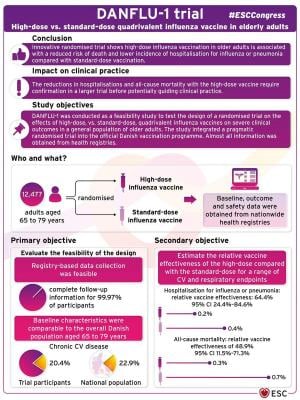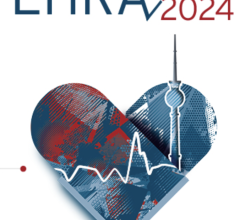
September 2, 2022 — In an innovative, pragmatic randomized trial, high-dose influenza vaccination in older adults was associated with a reduction in the risk of death by 49% and in the incidence of hospitalization for influenza or pneumonia by 64% compared with standard-dose vaccination. The late breaking research is presented in a Hot Line session at ESC Congress 2022.1
Senior author and chief investigator Professor Tor Biering-Sørensen of the Centre for Translational Cardiology and Pragmatic Randomized Trials, University of Copenhagen, Denmark said: “The reductions in hospitalizations and all-cause mortality with the high-dose vaccine were encouraging but require confirmation in a larger trial before potentially guiding clinical practice.”
Previous studies have investigated the association between influenza infection and cardiovascular events. One study found a six-fold increased risk of myocardial infarction in the week following a positive influenza test,2 while another found that approximately 19% of heart failure hospitalizations could be attributed to influenza in months with high influenza activity.3 A study of adults hospitalized with influenza found that almost 12% had an acute cardiovascular event.4 Observational5 and randomised6 studies indicate that influenza vaccination can prevent cardiovascular events.
High-dose vaccines contain 60 μg of haemagglutinin antigen for each strain, while standard-dose vaccines contain only 15 μg. Professor Biering-Sørensen said: “High-dose vaccines are approved for adults aged 65 years and older in most countries, and for those 60 years and older in some countries. However, only a few countries offer older adults a high-dose vaccine by default. Thus, high-dose vaccines are not widely implemented despite accumulating evidence of additional protection against influenza infection and influenza-related morbidity compared with standard-dose vaccines.”7-9
No individually randomized trial has assessed the effects of high-dose, compared with standard-dose, quadrivalent influenza vaccines on severe clinical outcomes such as hospitalizations and mortality in a general population of older adults. This would enable a full assessment of the potential public health value of high-dose vaccines. Due to the large sample size required, such a trial would need to incorporate innovative, pragmatic elements and DANFLU-1 was therefore conducted as a feasibility trial to test the design.
The study integrated a pragmatic randomized trial into the official Danish vaccination program by partnering with a private vaccination provider. The study was organized with a central trial site located at a public university hospital and more than 1,000 vaccination sessions across Denmark organized by the private vaccination provider. The open-label study randomized participants 1:1 to either high-dose or standard-dose quadrivalent influenza vaccine. Older adults aged 65 to 79 years were enrolled, randomized, and vaccinated during the sessions. Participant data were then transferred to the central trial site and linked to nationwide Danish administrative health registries from which all other data (baseline, outcome, safety) were obtained. Professor Biering-Sørensen said: “The trial only required one study visit with almost all information obtained from administrative health registries. This greatly reduced the burden on both participants and investigators.”
The primary objective was to evaluate the feasibility of the design such as the number of participants included and randomized to each vaccine, agreement between randomization assignment and actual received vaccine, the balance between groups in terms of number of subjects in each arm and baseline characteristics, and a comparison of baseline characteristics with the overall Danish general population aged 65 to 79 years. The second objective was to estimate the relative vaccine effectiveness of the high-dose compared with the standard-dose for a range of cardiovascular and respiratory endpoints.
A total of 12,477 participants were included in the final analyses: 6,245 randomized to high-dose vaccine and 6,232 randomized to standard-dose vaccine. The average age was 71.7 years and 5,877 (47.1%) were women. Registry-based data collection was feasible with complete follow-up information for 99.97% of participants. Baseline characteristics were comparable to the overall Danish population aged 65 to 79 years. For example, 20.4% of trial participants had chronic cardiovascular disease compared with 22.9% of the national population.
High-dose recipients had a lower incidence of hospitalization for influenza or pneumonia compared with standard-dose recipients, with 10 (0.2%) versus 28 (0.4%) events, respectively, and a relative vaccine effectiveness of 64.4% (95% confidence interval [CI] 24.4% to 84.6%). High-dose recipients also had a lower incidence of all-cause mortality, with 21 (0.3%) versus 41 (0.7%) events, respectively, and a relative vaccine effectiveness of 48.9% (95% CI 11.5% to 71.3%). There were no significant differences in serious adverse events between the high-dose and standard-dose groups.
Professor Biering-Sørensen said: “Conducting an innovative pragmatic randomised trial in Denmark using administrative health registries as the primary data source was feasible. Integrating an influenza vaccine trial into the official Danish vaccination programe was also feasible. The next step is to conduct a fully powered trial of high-dose versus standard-dose quadrivalent influenza vaccine in older adults. The required sample size is expected to be around 200,000 participants.”
For more information: www.escardio.org
References and Notes
1DANFLU-1 will be discussed during:
Hot Line Session 2 on Saturday 27 August at 08:30 to 10:00 CEST in the Barcelona auditorium.
Meet the Trialist – DANFLU-1 on Saturday 27 August at 12:00 to 12:20 CEST on the ESC TV Stage.
2Kwong JC, Schwartz KL, Campitelli MA, et al. Acute myocardial infarction after laboratory-confirmed influenza infection. N Engl J Med. 2018;378:345–353.
3Kytömaa S, Hegde S, Claggett B, et al. Association of influenza-like illness activity with hospitalizations for heart failure: The Atherosclerosis Risk in Communities Study. JAMA Cardiol. 2019;4:363–369.
4Chow EJ, Rolfes MA, O’Halloran A, et al. Acute cardiovascular events associated with influenza in hospitalized adults. Ann Intern Med. 2020;173:605–613.
5Modin D, Jørgensen ME, Gislason G, et al. Influenza vaccine in heart failure. Circulation. 2019;139:575–586.
6Fröbert O, Götberg M, Erlinge D, et al. Influenza vaccination after myocardial infarction: A randomized, double-blind, placebo-controlled, multicenter trial. Circulation. 2021;144:1476–1484.
7DiazGranados CA, Dunning AJ, Kimmel M, et al. Efficacy of high-dose versus standard-dose influenza vaccine in older adults. N Engl J Med. 2014;371:635–645
8DiazGranados CA, Robertson CA, Talbot HK, et al. Prevention of serious events in adults 65 years of age or older: A comparison between high-dose and standard-dose inactivated influenza vaccines. Vaccine. 2015;33:4988–4993.
9Lee JKH, Lam GKL, Shin T, et al. Efficacy and effectiveness of high-dose influenza vaccine in older adults by circulating strain and antigenic match: An updated systematic review and meta-analysis. Vaccine. 2021;39:A24–A35.


 August 29, 2025
August 29, 2025 









